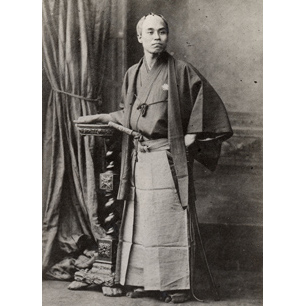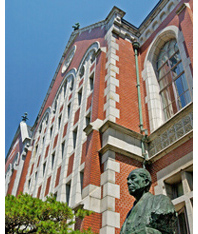Relearning about Keio University and Yukichi Fukuzawa(1)
The origin of Keio University can be traced back to a private academy founded by Yukichi Fukuzawa. It is no exaggeration to say that the objective of establishing this school was to give form to the founder’s principles. Therefore, to learn more about Keio University, we must first familiarize ourselves with its founder, Yukichi Fukuzawa. Fukuzawa was not only an educator, he was also a visionary leader of his time who contributed greatly to the modernization of Japan by pioneering the introduction of Western culture and thought to Japan.
To begin with…
Re-examining Keio University and Yukichi Fukuzawa

Yukichi Fukuzawa was more than just the founder of Keio University. Take the 10,000 yen note for example. Why was his portrait selected for the highest denomination in Japan? What exactly did he accomplish?
In short, Fukuzawa was a social thinker and educator that made extraordinary contributions to Japan’s modernization during a period of political ferment from late Edo to early Meiji era. He published many books, starting with An Encouragement of Learning, that discussed the virtue of freedom and equality and the value of learning; and in his various other publications he also advocated the importance of advancing Japanese civilization through Westernization.
Fukuzawa’s activities were not limited to writing. He also introduced and popularized the concept of Western speech in Japan, which he initiated and practiced at the Mita Public Speaking Hall. He also founded Japan’s oldest social club, Kojunsha, which was intended to allow various people, regardless of rank and profession, to come together to “exchange knowledge and make inquiries on social matters.” “Social matters” refers to mutual relationships, such as business dealings, undertaking of new enterprises, and borrowing and lending of money, that arise between people; and “making inquiries” suggests the exchange of advice, ideas, and opinions so that these relationships work smoothly. Intellectuals from all walks of life became members of Kojunsha. It held speeches around Japan to enlighten and attract more membership from the public, and it also launched the magazine, Kojun Zasshi.
Fukuzawa also founded the daily newspaper, Jiji Shimpo, in 1882 and took charge of its management. In the first issue, he declared that the newspaper distance itself from partisanship of political parties and hold a neutral position free from interests (独立不羈[dokuritsu fuki—independent and free]), and on this basis, Jiji Shimpo voiced opinions on a wide range of topics through its editorials.
Kojunsha, Jiji Shimpo, and Keio University are widely considered three of Fukuzawa’s biggest undertakings. Among them, Keio University was always at the base of his activities. There is a quote by Fukuzawa regarding the mission of Keio University from a speech he gave in 1896: “I aspire to make it the springhead of noble character and a model of intellect and virtue for the whole nation.” He hoped that the faculty, alumni, and students of Keio—or members of the corporation—go on to become leaders of society as a whole.
This mission of the university has remained unchanged to this day. The significance and joy of learning at Keio University derive from fulfilling Fukuzawa’s aspirations and carrying this mission forward into the future. It is now 114 years since Fukuzawa’s death, but Keio University is continuing to weave its own history.
01: Keio University’s Founding Principle of Jiga Sakko—I Create History

Yukichi Fukuzawa, who was born in 1835 and passed away in 1901, lived through two very different times in the history of Japan—the early modern period of the late Edo era and the modern period in the Meiji era. As a social thinker and educator, he left behind countless notable words and statements in his writings and literary records.
New students at Keio University will encounter in various situations during their student life four-character idioms such as 独立自尊 (dokuritsu jison—independence and self-respect), 半学半教 (hangaku hankyo—learning while teaching, teaching while learning), 社中協力 (shachu kyoryoku—collaboration among the members of the corporation) , and 躬行実践 (kyuko jissen—acting on one’s own principles ). What I regard as one of the most important four-character idiom for Keio University is 自我作古 (jiga sakko). This appears in the Chinese book Soshi (History of the Song Dynasty) and embodies the meaning “I create history ” (ware yori inishie wo nasu).

In 1868, Fukuzawa named his private school “Keio Gijuku, which had until then no official name and he published the Keio Gijuku no Ki (Notes on Keio Gijuku), which pronounced the inauguration of Keio Gijuku as a modern institution. Keio Gijuku no Ki praised the hard work of Ryotaku Maeno, Hoshu Katsuragawa, Genpaku Sugita, and other scholars at Keio who were pioneers of Western studies: “These men were fired with the idea of themselves opening a new era in the history of learning (jiga sakko)” and “gave their extreme efforts to the studies, days and nights, till they were neglecting their rests and taking of food.” This revealed Keio’s strong commitment to carrying on the pursuit of Western learning.
However, jiga sakko is not about being a pioneer who continues to influence generations to come. The true meaning of the word is that the work you accomplish will become the foundation and those who carry on your work will exceed you; it is a word that epitomizes courage by accepting the fact that you will one day become a part of the past, a part of antiquity. I believe that Fukuzawa established Keio to create a place in which future generations can continue to clear the path for the future and move forward with no end in sight.
Thus the history of Keio University was created through a relay of knowledge, passed on from person to person.
As a member of Keio University, which was founded on the basic principle of jiga sakko, I hope that you (new students) spare no effort in studying, achieve results that surpass those that came before you, and be able to rejoice in achievements that surpass yours by those that come after you.
Above all else, now that your lives are connected with Keio University, I hope they will start to shine even brighter.
Relearning about Keio University and Yukichi Fukuzawa(2) is scheduled to be updated around October 13.
